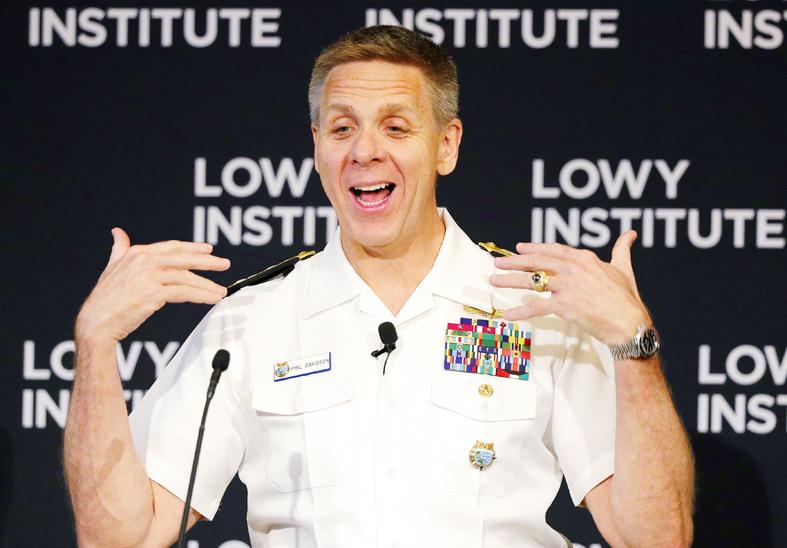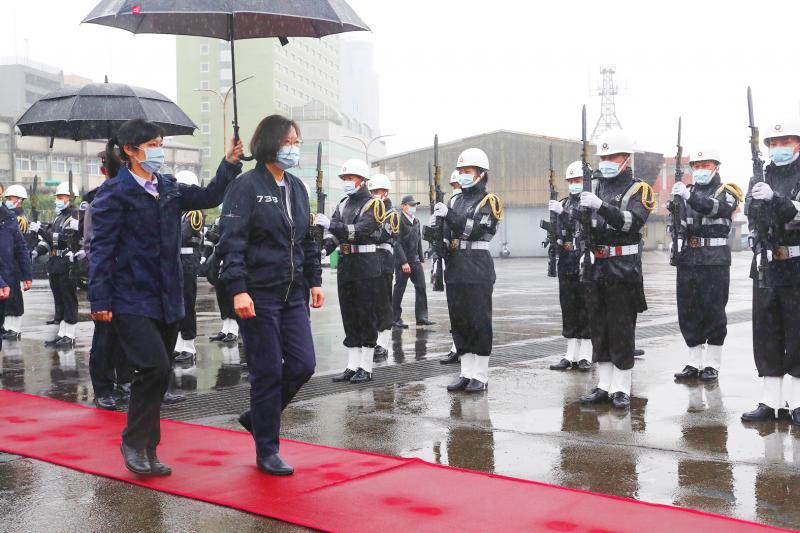China could invade Taiwan within the next six years, US Navy Admiral Philip Davidson said on Tuesday, raising hackles in Beijing, which yesterday accused the top US commander of attempting to “hype up” the threat of an invasion to inflate Washington’s defense spending.
“I worry that they’re [China] accelerating their ambitions to supplant the United States and our leadership role in the rules-based international order ... by 2050,” Washington’s top military officer in the Asia-Pacific region said.
“Taiwan is clearly one of their ambitions before that and I think the threat is manifest during this decade — in fact, in the next six years,” Davidson told a US Senate Committee on Armed Services hearing.

Photo: AP
Former US president Donald Trump embraced warmer ties with Taiwan, as he feuded with China on issues such as trade and national security.
US President Joe Biden’s administration has offered Taiwan cause for optimism for continued support aside from the US Department of State, saying in January that US commitment to the nation is “rock solid.”
Representative to the US Hsiao Bi-khim (蕭美琴) was formally invited to Biden’s inauguration, an unprecedented move since 1979.

Photo: CNA
China has also made expansive territorial claims in the resource-rich South China Sea and even threatens the US territory of Guam, Davidson said.
“Guam is a target today,” he said, adding that the Chinese military released a video simulating an attack on an island base strongly resembling US facilities in Diego Garcia and Guam.
He called on US lawmakers to approve the installation on Guam of an Aegis Ashore anti-missile battery, which is capable of intercepting the most powerful Chinese missiles in flight.
Guam “needs to be defended and it needs to be prepared for the threats that will come in the future,” Davidson said.
In addition to other Aegis missile defense systems destined for Australia and Japan, Davidson called on lawmakers to budget for offensive armaments “to let China know that the costs of what they seek to do are too high.”
Beijing was swift to bat away the admiral’s comments.
“Some US people continue to use the Taiwan issue to hype up China’s military threat,” Chinese Ministry of Foreign Affairs spokesman Zhao Lijian (趙立堅) told reporters in Beijing. “But in essence, this is the US searching for a pretext to increase its military spending, expand its forces and interfere in regional affairs.”

SECURITY: As China is ‘reshaping’ Hong Kong’s population, Taiwan must raise the eligibility threshold for applications from Hong Kongers, Chiu Chui-cheng said When Hong Kong and Macau citizens apply for residency in Taiwan, it would be under a new category that includes a “national security observation period,” Mainland Affairs Council (MAC) Minister Chiu Chui-cheng (邱垂正) said yesterday. President William Lai (賴清德) on March 13 announced 17 strategies to counter China’s aggression toward Taiwan, including incorporating national security considerations into the review process for residency applications from Hong Kong and Macau citizens. The situation in Hong Kong is constantly changing, Chiu said to media yesterday on the sidelines of the Taipei Technology Run hosted by the Taipei Neihu Technology Park Development Association. With

A US Marine Corps regiment equipped with Naval Strike Missiles (NSM) is set to participate in the upcoming Balikatan 25 exercise in the Luzon Strait, marking the system’s first-ever deployment in the Philippines. US and Philippine officials have separately confirmed that the Navy Marine Expeditionary Ship Interdiction System (NMESIS) — the mobile launch platform for the Naval Strike Missile — would take part in the joint exercise. The missiles are being deployed to “a strategic first island chain chokepoint” in the waters between Taiwan proper and the Philippines, US-based Naval News reported. “The Luzon Strait and Bashi Channel represent a critical access

‘FORM OF PROTEST’: The German Institute Taipei said it was ‘shocked’ to see Nazi symbolism used in connection with political aims as it condemned the incident Sung Chien-liang (宋建樑), who led efforts to recall Democratic Progressive Party (DPP) Legislator Lee Kun-cheng (李坤城), was released on bail of NT$80,000 yesterday amid an outcry over a Nazi armband he wore to questioning the night before. Sung arrived at the New Taipei City District Prosecutors’ Office for questioning in a recall petition forgery case on Tuesday night wearing a red armband bearing a swastika, carrying a copy of Adolf Hitler’s Mein Kampf and giving a Nazi salute. Sung left the building at 1:15am without the armband and apparently covering the book with a coat. This is a serious international scandal and Chinese

COUNTERINTELLIGENCE TRAINING: The ministry said 87.5 percent of the apprehended Chinese agents were reported by service members they tried to lure into becoming spies Taiwanese organized crime, illegal money lenders, temples and civic groups are complicit in Beijing’s infiltration of the armed forces, the Ministry of National Defense (MND) said in a report yesterday. Retired service members who had been turned to Beijing’s cause mainly relied on those channels to infiltrate the Taiwanese military, according to the report to be submitted to lawmakers ahead of tomorrow’s hearing on Chinese espionage in the military. Chinese intelligence typically used blackmail, Internet-based communications, bribery or debts to loan sharks to leverage active service personnel to do its bidding, it said. China’s main goals are to collect intelligence, and develop a